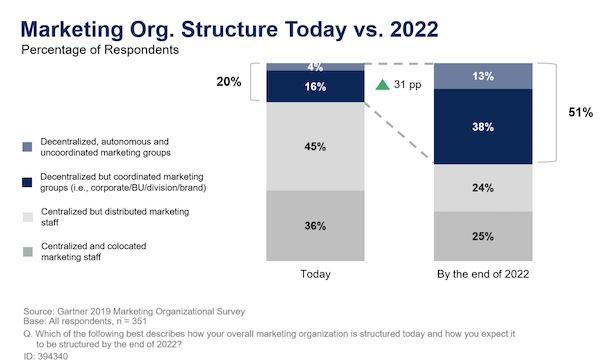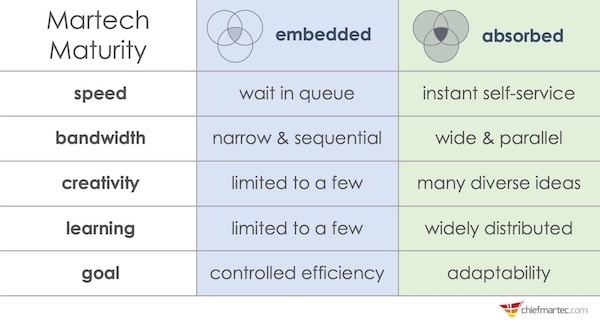In Gartner’s most recent Marketing Organizational Survey for 2019 — how marketing leaders structure their teams today and how they expect them to change over the next several years — a remarkable finding popped out to me:
20% of respondents reported that they run some form of decentralized marketing organization today. By the end of 2022, however, a majority — 51% — expect they will have a decentralized structure in place.
A 31 point jump — from one-in-five marketing orgs being decentralized to one-in-two.
This caught my attention because, as regular readers know, I’ve been fascinated by how martech and marketing ops teams are adapting to the opportunities of decentralized marketing empowerment. This was one of the key axes in The New Rules of Marketing Technology & Operations.
More recently, I wrote about Platforming Marketing: 8 P’s of Self-Service Martech that describes a framework for managing marketing technology in a decentralized environment.
Of course, I realized when publishing it that it was a little ahead of the curve. Most marketing organizations are still in the “assisted” or “embedded” stage of martech maturity. Relatively few have embraced or implemented a truly “absorbed” stage of martech adoption.
How many? Well, inferring a correlation with Gartner’s findings in this report, probably less than 20% today. But following that line of reasoning, we should expect more than half to make it there within three years.
Logically, this isn’t surprising. The motivations for “absorbed” martech operating models are greater speed, bandwidth, creativity, learning, and adaptability — the things firms simply must do to compete in today’s environment:
But the rate at which the gap is expected to close is a little surprising. Perhaps “aspirational” is a better word. Organizational change is still relatively hard compared to the rate by which the underlying technological possibilities advance, as Martec’s Law continues to demonstrate.
Moving from centralization to decentralization will be a major mental model shift.
But the majority of marketing decision-makers surveyed in this Gartner report see it coming fast. By the way, 74% of the participants in this study were from organizations with $1 billion or more in annual revenue. It’s noteworthy that these are relatively mature companies embracing this concept.
The post The (near) future of marketing is decentralized appeared first on Chief Marketing Technologist.
from Chief Marketing Technologist https://ift.tt/31SwBfX
via IFTTT


Comments
Post a Comment